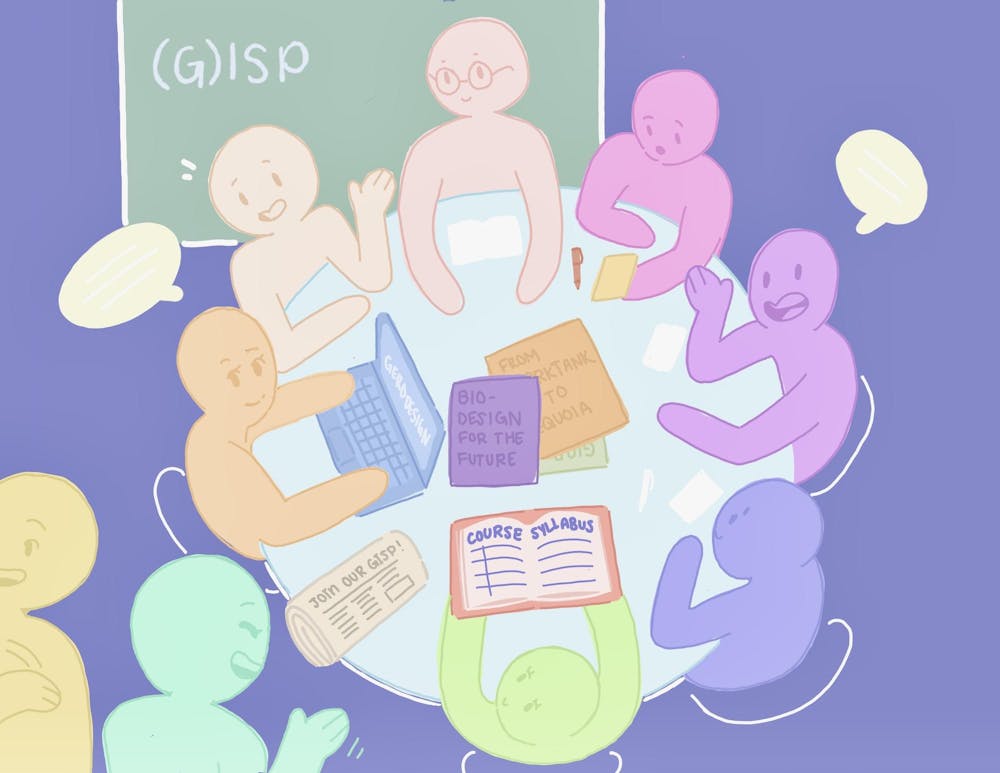As 22 students filed into a small classroom in Sayles on Monday for GISP 0010: “Addressing Stigma and Creating Conversations Around Mental Health,” facilitator Michael OuYang ’26 prepared the day’s opening exercise: class karaoke to “My Girl” by The Temptations. Within seconds, the room was filled with laughter, shouts and smiles — the best way, OuYang said, to break the ice before delving into students’ personal experiences with mental health.
OuYang’s course is one of 11 group independent study projects offered this semester. Overseen by the Curricular Resource Center, the projects involve collaboration between at least one student and a faculty advisor to “develop a credit-bearing course that is not a regular Brown offering,” according to the CRC website.
Unlike independent and global independent study projects, GISPs allow other students to register for the course on Courses@Brown at the discretion of the student facilitator.
This semester features the largest number of GISPs offered since before the pandemic, according to Courses@Brown. Including OuYang’s, four GISPs offered this semester have more than 20 students enrolled.
By facilitating and registering for a GISP, students “learn a lot about what makes a course for credit a course — clear learning goals, a method for discussion and analysis and the joy of collaborating with their advisor and other students,” wrote Peggy Chang, associate dean of the College for curricular engagement and director of the CRC, in an email to The Herald.
Daniel Newgarden ’25 and Kristoffer Balintona ’24, independent study co-coordinators, said that the process of creating a GISP starts with an idea. “We want to help turn a Brown student’s passion into a course,” Newgarden said. The CRC “is here to help them do that, however possible, by giving them advice and guiding them through the process.”
Students typically begin discussing their course idea with coordinators like Newgarden and Balintona at the CRC in the semester before they hope to offer it. Coordinators “talk people through their concept” and inform them of other CRC programming and resources available, Newgarden told The Herald.
As the founder of No Empty Seats, a nonprofit organization aiming to spread mental health awareness, OuYang noticed last fall that there were no active course offerings discussing mental health outreach.
“It’s important to teach people what goes into mental health outreach and how we can make this campus a better place,” OuYang said.
After finding a faculty sponsor, student facilitators like OuYang create a lengthy proposal and syllabus — OuYang’s reached 30 pages with over 100 sources — outlining the course curriculum. “You have to answer questions about why you think (your course) fills a gap in the curriculum,” OuYang said.
After rounds of advising meetings with coordinators, the students will then submit their proposal to the CRC for a preliminary review ahead of the November deadline. “We think about whether the syllabus is well-structured, and if the goals of the class are well-thought-out,” Newgarden said.
The proposal is then sent to the College Curriculum Council — an elected body of administrators, faculty and students responsible for the undergraduate curriculum — for final approval.
Each GISP offered is different, as the program is “extremely flexible by design,” Newgarden said. “The program doesn’t have many restrictions on what can or can’t be the structure of the course.” But regardless of the way each GISP is structured, all grading is done by the course’s faculty advisor.
Some GISPs are entirely collaborative, in which the student facilitator and other registered students take turns assigning readings and facilitating course discussions, according to Newgarden and Balintona. “The student (coordinator) isn’t necessarily the professor teaching the course,” Balintona said. “They’re creating the course they want to take in the future.”
Other groups are led primarily by the students who proposed the course, like OuYang’s. In addition to creating the course syllabus and assigning weekly readings, OuYang leads class discussions and activities and coordinates student presentations. “I share my experiences because it’s scary for people to talk about mental illness,” he said. “I know people follow by example.”
Erin Williams ’26, who is currently registered for OuYang’s course, believes that OuYang’s facilitation and experience with mental health outreach allows the course content “to resonate on a deeper level, because you hear stories from people in the class that are close in age and have similar experiences,” she said. “You come to the realization that other people are going through the same things that we are.”
OuYang noted that creating and leading a course on your own is no easy feat. “It’s much harder than I thought — some students are just looking at you, some are checking their phones, some are on their computers and some are zoned out,” he said. “I had to learn that I can’t take anything personally.”
But facilitating a GISP comes with some benefits, too. “Some people have said this is their favorite class so far at Brown, which I think is one of the most rewarding things,” OuYang said. “I truly think it’s making a difference.”
Each GISP can only be offered once, according to Newgarden and Balintona. But if a GISP is widely successful, it can occasionally become a University-offered course. MUSC 0021J: “Stephen Sondheim and the American Musical” and APMA 1910: “Race and Gender in the Scientific Community” are two courses offered this academic year that originated from GISPs.
The CRC hopes that the recent popularity of GISPs and other independent study programs will continue to rise, Newgarden said.
Balintona emphasized that creating a GISP “is not just feasible — it’s realistic.”
Julianna Chang is the managing editor of production and development of The Herald's 135th Editorial Board. She previously served as a university news editor overseeing the academics & advising and student government beats. A junior from the Bay Area, Julianna is studying Biology and Political Science on the pre-medical track. When she's not in class or in the office, she can be found eating some type of noodle soup and devouring bad books.





